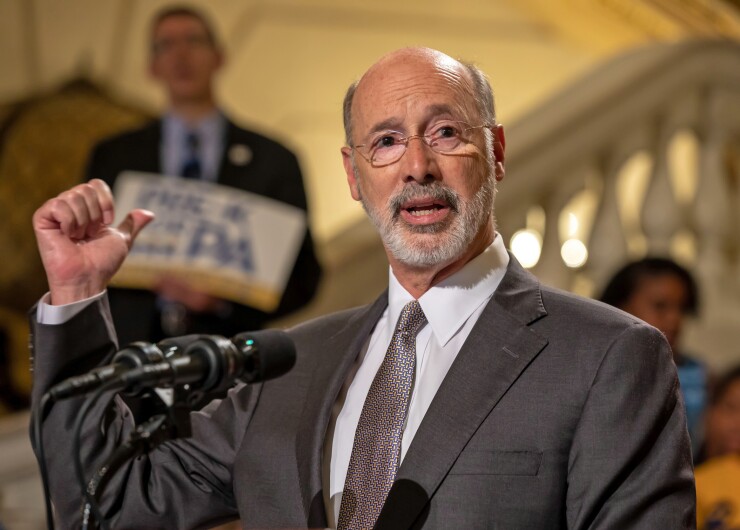Pennsylvania Gov. Tom Wolf signed a $34 billion fiscal 2020 budget on time and free of drama — both unusual for the commonwealth.
While the spending plan included only some of his objectives, it reflects a governor more pragmatic since he took office in January 2015, according to Fitch Ratings senior director Eric Kim.

Wolf, a Democrat, works with a Republican-dominated legislature.
“When you look at the evolution of the governor's budget preparations since he took office, there's been more pragmatism in the 'asks' on the executive side,” Kim said. “His proposal for a severance tax [on natural gas drilling] was not part of the budget, and the process went smoother. There has been a clear evolution in the governor's proposals.”
Speaking at the state capitol rotunda in Harrisburg after Friday’s budget signing, Wolf cited a $265 million funding increase for pre-kindergarten through grade 12.
Overall funding in that category under Wolf has risen by $1.2 billion and early education assistance has doubled.
Flanked by school children, Wolf cited the reversal of education cuts under his predecessor, Republican Tom Corbett. “It was hard to watch,” Wolf said of those cuts.
Lawmakers also approved a measure enabling the administration to take control of Pennsylvania’s online health insurance exchange program.
The budget also provides more funds for public colleges and universities. It includes no tax increases and no new taxes or fees.
Wolf was disappointed over one measure that didn’t pass: an increase in the minimum wage, which the governor had sought to raise to $12 per hour by July 1 and eventually $15. The current $7.25 is lower than Pennsylvania’s neighboring states.
Villanova School of Business professor David Fiorenza said Wolf’s proposed hike would “destroy” all businesses in the state and worsen the unemployment rate.
“The free markets should decide what is paid to workers,” said Fiorenza, a former chief financial officer of Radnor Township, outside Philadelphia. “Most companies, in retail, hospitality [and] food services are already paying over $8 an hour to start.”

Should the state go to $15 per hour, Fiorenza suggested raising the wage by $1 every other year to enable businesses to plan. At $15, he added, “those workers would not then be eligible for any of the state or federal supplements that are provided.”
Moody’s Investors Service rates Pennsylvania's general obligation bonds Aa3 with a stable outlook. S&P Global Ratings and Fitch Ratings assign A-plus and AA-minus, respectively. Their respective outlooks are stable and negative.
The commonwealth sold $900 million of GOs three weeks ago.
“We had been concerned about their budget decisions and their rainy-day balance, but they've been making fairly good progress,” Kim said. “The budget was done on time, which is no small feat in Pennsylvania.
“It helps to have money and adding $250 million to the rainy-day fund was absolutely a step in the right direction. Also, the commonwealth did well on collections, especially on the business tax side.”
According to Kim. Fitch will further examine the budget for structural balance.
Wolf also said he would continue to push for the drilling tax to fund capital projects, notably for resilience. Republican leaders have argued that the existing “impact fees,” enacted under Corbett, are essentially taxes.
The budget includes nearly $85 million for the Community Waiver Program, which provides home- and community-based services for intellectually challenged persons; $60 million for school security grants; and nearly $20 million for agriculture.





